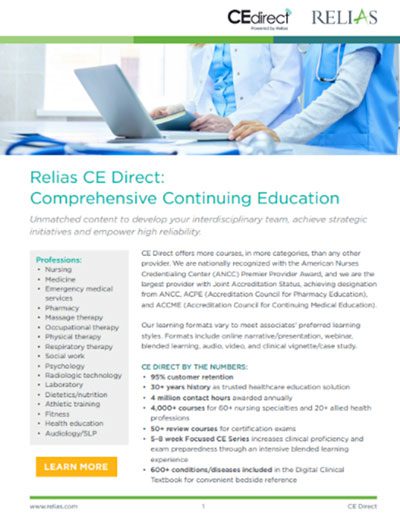Healthcare, medicine, and nursing are industries that are always in flux. For the professionals in these industries, the base of evidence they draw from is constantly shifting and adapting with regard to the way they diagnose, treat and manage symptoms of various common and not so common diseases and disorders. And just when they think they have a firm grasp on one aspect of any disease or disorder, new evidence develops, calling their previous assumptions into question.
In a community healthcare setting, the same rings true. How can these physicians and nurses ever keep up and regularly acquire the knowledge they need to provide care when the core of their life’s work is based on the ever-changing needs and treatment of the human body?
There is always something new for community healthcare professionals to learn, or some new evidence or research study to keep in mind. This is especially the case with the increase in integrated care settings, where clinicians need to treat a variety of people—including the underserved, underinsured and uninsured—with a variety of treatment needs, from cancer, influenza and diabetes to opioid use disorders and serious mental illness.
Of course, it’s important to note that not only do healthcare professionals want continuing education (CE) and continuing medical education (CME) because of certification requirements and to maintain licensure—there are always those who enjoy learning simply to accumulate new knowledge and skills in the interest of staying current in their field and practice.
The evolution of continuing education in healthcare
The need for continuing education has been well-established and documented for decades. Boards of nursing, medicine and other complex disciplines generally require professionals to complete a certain number of continuing education credits, or hours, for each multi-year certification or licensure cycle. The exact number of hours required varies in the U.S. by state and by profession, whether for physicians or nurses. Gaining knowledge through CE and CME is the norm across healthcare professions and usually a career-long practice.
While live conferences and seminars are common ways for physicians and nurses to earn CE and CME credits and acquire new information, the travel-related expenses can easily become a burden, not to mention the entry fees for some of the larger, more well-known events for nurses and other healthcare professionals. This is where online learning comes in.
The breadth and depth of online continuing education for healthcare professionals
With the arrival of e-learning, learning management systems and mobile apps, receiving continuing education credits no longer requires paper brochures and tests to be sent by mail. The introduction of online learning made it possible for learners to complete their continuing education courses without having them tied to a time or place. A vast number of CE and CME credits are now earned online due to the benefits it affords healthcare organizations, including:
- 24/7 access
- Travel-related cost savings
- Less time away from work
- Countless administrative hours saved
It is important for physicians and nurses in a community-based or integrated care setting to have access to CE and CME that has both a depth and breadth of options. Keep in mind, however, that having several courses to choose from is great, but making sure they are current, relevant and include multiple topics and depths of learning for different types of care.
Take pediatric care, for example. Course options could vary from a basic overview of clinical pediatric nutrition to a course on reducing pain during minor procedures or an advanced course on technical skills in pediatric emergency nursing. CE and CME courses can involve new clinical information about disease processes and syndromes that physicians and nurses see on a regular basis, and they can also offer opportunities to learn about new or rare conditions and how to approach them.
In community and integrated healthcare, apart from physical diseases and how to treat them, continuing education and CME courses can also provide information on behavioral and mental healthcare topics like suicide, motivational interviewing techniques, trauma-informed care, substance use disorder and other psychosocial issues.
An abundance of knowledge
Online continuing education and continuing medical education represents a wealth of collective knowledge and learning opportunities for community healthcare professionals. It is the retention, practice and sharing of that knowledge that can make a lasting difference in the ever-changing healthcare industry.
The value of continuing education cannot be emphasized enough. A commitment to ongoing education to broaden one’s knowledge and expertise ultimately improves the quality of care and health outcomes of the diverse populations served in community-based care settings.
Do the clinical staff at your community or integrated care center have access to CE and CME? Read the fact sheet below to learn about the CE and CME courses Relias provides to help your staff maintain licensure and stay informed on the changes and practices in their field. Our courses are developed and regularly updated in-house by an interdisciplinary team of experts in your field. Even better? Our comprehensive learning management system includes a full library of CE and CME that you can offer to your clinical staff at no cost to them.

Relias CE Direct: Comprehensive Continuing Education
CE Direct, powered by Relias, offers unmatched continuing education content to develop your physicians and nurses. We are committed to helping you achieve your organization’s goals and improve the health outcomes of the people you serve.
Read the Fact Sheet →





